Rifftides: June 2008 Archives
Last week, jazz lost two journeyman artists valued for their dependability, versatility and
 swing. On the west coast, bassist Dave Carpenter died suddenly of a heart attack at the age of forty-eight. Most recently, Carpenter had been in drummer Peter Erskine's trio, which also included pianist Alan Pasqua. A veteran of the Buddy Rich, Woody Herman, Maynard Ferguson and Bill Holman big bands, he also worked with Bill Perkins, Jack Nimitz, Al Jarreau, Herb Geller, Bill Cunliffe, Jan Lundgren, Terry Gibbs, Buddy DeFranco and Richard Stoltzman, to name a few. In as great demand in Los Angeles studios as he was in clubs, Carpenter has a list of recording credits as long as both of your arms. To see the list and hear brief samples, go here.
swing. On the west coast, bassist Dave Carpenter died suddenly of a heart attack at the age of forty-eight. Most recently, Carpenter had been in drummer Peter Erskine's trio, which also included pianist Alan Pasqua. A veteran of the Buddy Rich, Woody Herman, Maynard Ferguson and Bill Holman big bands, he also worked with Bill Perkins, Jack Nimitz, Al Jarreau, Herb Geller, Bill Cunliffe, Jan Lundgren, Terry Gibbs, Buddy DeFranco and Richard Stoltzman, to name a few. In as great demand in Los Angeles studios as he was in clubs, Carpenter has a list of recording credits as long as both of your arms. To see the list and hear brief samples, go here.
On Saturday, pianist Ronnie Mathews died in New York of pancreatic  cancer. He was seventy-two. Mathews toured and recorded extensively with Max Roach, Freddie Hubbard, Roy Haynes, Dexter Gordon, Louis Hayes, and Woody Shaw. He had long associations with tenor saxophonist Johnny Griffin, drummer T. S. Monk, and trumpeter Roy Hargrove. See and hear him in this video clip of Griffin's quartet. Ignore the superfluous list of personnel from YouTube; the rhythm section is Mathews, drummer Kenny Washington and bassist Ray Drummond. The locale is the Village Vanguard in New York, not somewhere in Europe. Otherwise, YouTube got it right. Due to the site's ten-minute limit, the performance fades away before it ends, but it provides a generous idea of Mathews' skill as an accompanist and a soloist.
cancer. He was seventy-two. Mathews toured and recorded extensively with Max Roach, Freddie Hubbard, Roy Haynes, Dexter Gordon, Louis Hayes, and Woody Shaw. He had long associations with tenor saxophonist Johnny Griffin, drummer T. S. Monk, and trumpeter Roy Hargrove. See and hear him in this video clip of Griffin's quartet. Ignore the superfluous list of personnel from YouTube; the rhythm section is Mathews, drummer Kenny Washington and bassist Ray Drummond. The locale is the Village Vanguard in New York, not somewhere in Europe. Otherwise, YouTube got it right. Due to the site's ten-minute limit, the performance fades away before it ends, but it provides a generous idea of Mathews' skill as an accompanist and a soloist.
It sometimes takes Rifftides posts a while to catch up with their subjects. On August 22, 2006, I reported the results of research into the matter of a high school teacher who received a lot of attention in 1993 for using Frank Sinatra to punish miscreant students. Sinatra did not come to class to administer the discipline. Bruce Janu, the teacher, made the wayward kids listen to Sinatra recordings. Over the weekend, Mr. Janu, who teaches at John Hershey High School northwest of Chicago, e-mailed a message to bring us up to date.
In his teaching of sociology, Mr. Janu incorporates film study. He has developed a parallel career as a documentarian. His first full-scale film, about the genocide in Sudan, last year won awards for best documentary at two film festivals. Facing Sudan has screened at a dozen other festivals across the United States, from Charlotte, North Carolina, to Port Townsend, Washington. For more about Bruce Janu and Facing Sudan, go here.Someone recently sent me your blog post about the teacher who used Frank Sinatra as punishment. Well, I am that teacher. I still teach and I still use Sinatra in the classroom. Not so much for punishment anymore...more for enlightenment. I put extra-credit Frank
Sinatra questions on every test and often play Sinatra. In my Contemporary American Text class, I teach the history of jazz and, of course, include some Sinatra there as well. During the whole hoopla surrounding the "detention club," (it was a slow news day) some reporters attempted to get Sinatra's comment. Through his press person, it was relayed to the media that Sinatra had "no comment" other than to say that there are plenty of young people who like his music. I hope that in the years that I have been doing this, some kids have grown to appreciate a great singer.
The Rifftides post three weeks ago with the video of Peggy Lee's and Frank Sinatra's "Nice Work if You Can Get It" brought so much comment that another Lee installment seems justified. Here she is with her husband Dave Barbour on guitar. The song is Lee's composition "Maňana," a huge hit in 1947. In the current DVD pick (center column), I mention Lee's devotion to Barbour. In this clip, there is more evidence of it, and of the kind of playing that made him one of the great jazz guitarists of his era. This performance has an air of carefree fun, but the musicianship--by husband and wife--is serious.
This CD has a few of Lee's recordings from the 1940s, with Barbour leading the bands and playing guitar. This boxed set from Mosaic has even more of their collaborations, plus Barbour also playing for June Christy on some tracks. It includes transitory pop recordings, but there is a high ratio of quality to ho-hum.
Around 1955 (I must have been in kindergarten), I went to a concert at the 5th Avenue Theater in Seattle and for the first time heard Ernestine Anderson. She sang with a big band. I was impressed with the quality of her voice, her phrasing, her time, the lack of gimmickry in her delivery and how she looked in her red gown. A year or so later, when she was in Sweden she recorded with Harry Arnold's band. The long-playing record that resulted, Hot Cargo, was one of the best vocal albums of the decade and remains an example of Anderson at the peak of her talent.
in Seattle and for the first time heard Ernestine Anderson. She sang with a big band. I was impressed with the quality of her voice, her phrasing, her time, the lack of gimmickry in her delivery and how she looked in her red gown. A year or so later, when she was in Sweden she recorded with Harry Arnold's band. The long-playing record that resulted, Hot Cargo, was one of the best vocal albums of the decade and remains an example of Anderson at the peak of her talent.
Over the years, Anderson's career and the quality of her singing have had their ups and downs. Now, she faces a discouraging down. At the age of seventy-nine, she is in financial trouble and about to be evicted from her house in Seattle. Friends and admirers are trying to raise money to stop or delay the eviction. They have set up a rescue account for her at the Bank of America. Time is short. She is scheduled to be kicked out at the end of June. Details are in this column by Robert L. Jamieson, Jr. of the Seattle Post Intelligencer
If you need to be inspired to help, watch this performance by Anderson with pianist Monty Alexander, bassist Ray Brown and drummer Kenny Clare in Berlin in 1978. Those are the musicians. Ignore the You Tube identifications, except for Brown; they got him right.
For more on Anderson's dilemma and information about her life and career, visit her web site.
Exactly how Anderson keeps her contralto so plush and supple ranks among the sweet imponderables of the art of jazz singing.... she remains an eloquent song interpreter with a broad array of expressive devices at her command. -- Howard Reich, Chicago Tribune, September, 2004
Anderson remains a wonderfully expressive vocalist, able to pierce the emotional core of a lyric with seemingly little effort. -- Mike Joyce, The Washington Post, May, 1999
From time to time, Rifftides readers have suggested that in evaluations of music I should pay more attention to sound quality. Like many musicians and critics, although certainly not all, I concentrate more on the notes than the reproduction. Once when Paul Desmond and I were listening to an ancient LP, I apologized for the scratches. Desmond was no technophobe; he loved the electronic wonders of his time. If he were around now, he would have an iPhone or a Blackberry, an iPod or a Zune--maybe all of those--and the best home theater and sound system available. But what he said that day was, "As long as I can hear what everybody's doing, I don't worry about scratches. It can be on a record, a tape or a strip of cellophane, for all I care. I listen to the music." We agreed on that.
Audiophile sound, then, is not a primary requirement for my listening, but I appreciate it and have reasonably good equipment, so when Rifftides reader Michael Baldwin suggests a listening comparison, I'm willing to play along. Mr. Baldwin writes:
In a head-to-head comparison between the "Keepnews Collection" reissue CD series and the corresponding OJC CDs, which do you think sounds better? It seems to me that Joe Tarantino is utilizing the 24-bit remastering process well, and that the Keepnews versions uniformly sound better than their OJC counterparts, which are essentially flat transfers from the original master tape without any "futzing about." Your opinion, please?
Orrin Keepnews produced the original recordings for Riverside, Milestone or Landmark. He co-founded Riverside and founded the other two. The labels are all now owned by Concord Music Group. Most of the recordings in the Keepnews series appeared in the first instance as long-playing vinyl records, then at least once as compact discs. This time around, engineer Tarantino remastered them with the latest digital technology and Keepnews produced them for reissue. For A/B comparison, I listened to the five most recent releases in the Keepnews Collection. They are:
McCoy Tyner, Fly With the Wind (Milestone)
Coleman Hawkins, The Hawk Flies High (Riverside)
Sonny Rollins, The Freedom Suite (Riverside)
Wes Montgomery, Incredible Jazz Guitar (Riverside)
Nat Adderley, Work Song (Riverside)
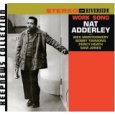 For the comparison, I fed two compact disc players into my sound system, played the OJC and Keepnews Collection CDs simultaneously and switched back and forth. I have no scopes or other test equipment. If I had, they might well show that the two players have different characteristics, although they sound the same to me when I do an A/B test playing identical copies of the same CD. The only test devices I own are attached to the sides of my head, so there is nothing scientific about my conclusions. To paraphrase Lester Young, I can't tell you about your ears on your head, I can only tell you about my ears on my head. Your reactions might be more complex and extensive. Mine are simple.
For the comparison, I fed two compact disc players into my sound system, played the OJC and Keepnews Collection CDs simultaneously and switched back and forth. I have no scopes or other test equipment. If I had, they might well show that the two players have different characteristics, although they sound the same to me when I do an A/B test playing identical copies of the same CD. The only test devices I own are attached to the sides of my head, so there is nothing scientific about my conclusions. To paraphrase Lester Young, I can't tell you about your ears on your head, I can only tell you about my ears on my head. Your reactions might be more complex and extensive. Mine are simple.
In all five cases, I found that the stereo effect in the new versions is less dramatic than in the OJCs, that there was less inherent gain (volume) and that the high frequencies seem rolled off a bit. In general, the OJCs sounded brighter, more lively.
I must emphasize that I am splitting hairs. To apply the Desmond standard, in both versions I could hear what everybody was doing. These albums contain some of the best playing that Montgomery, Adderley, Hawkins and Rollins recorded in the late 1950s and early '60s, and some of Tyner's finest work of the '70s. If you own the OJCs, I see no reason to ditch them in favor of the OK Collection versions. If you own neither and buy the new releases, you will have high quality reproductions of five imperishable old masters.
Make that six old masters. Mr. Keepnews deserves a lot of credit for preserving this music in the first place, and each CD in the OK Collection includes a new essay with his recollections and reevaluations.
The Rifftides staff invites you to use the comment function at the end of this item and let us know the results of your own comparison test.
In the 1970s, Red Garland told me about the pianists who influenced him when he was learning. He mentioned Nat Cole, James P. Johnson, Luckey Roberts, Teddy Wilson and Bud Powell. Then he said,
Tatum, of course was the master. He was Mr. Piano. The first time I heard a Tatum record--I think it was "Tiger Rag"--I thought it was at least three pianists.
Garland was far from the only listener who was convinced that Art Tatum's 1933 recording of "Tiger Rag" was the work of more than one pianist--or the product of multiple recording. Seventy-five years later, "Tiger Rag" and other Tatum masterpieces are recreated with digital wizardry in sound exponentially more pristine than that of the 78 rpm shellac or the LP and CD reissues of later decades. They are no less astonishing, but I am not persuaded by the gee-whiz promotion surrounding the project that they are more so.
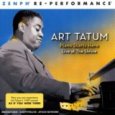 Zenph Studios captured four of Tatum's 1933 recordings and his 1949 Shrine Auditorium concert on special software and processed them for reproduction on a Yamaha Disklavier concert grand piano. They played them back on the Disklavier on the stage of The Shrine in Los Angeles and recorded as if Tatum had been at the keyboard. The results are on a Sony Classical CD which, like the LP and CD of the real Tatum performances that preceded it, is called Piano Starts Here: Live at The Shrine, with a banner across the top of the cover: Zenph Re-Performance. Tatum's notes are reproduced with uncanny accuracy. I have done A/B comparisons of the Zenph and the Columbia Jazz Masterpieces CD, which is still available, and been impressed with the Zenph folks' victory over the shortcomings of the original recordings, including unfavorable ambient sound, inconsistent recorder speeds, scratches and pops. In separate tracks, ten of the thirteen pieces play again in binaural stereo versions meant to be heard on headphones, placing the listener as if he were Tatum on the piano bench. It's quite an experience.
Zenph Studios captured four of Tatum's 1933 recordings and his 1949 Shrine Auditorium concert on special software and processed them for reproduction on a Yamaha Disklavier concert grand piano. They played them back on the Disklavier on the stage of The Shrine in Los Angeles and recorded as if Tatum had been at the keyboard. The results are on a Sony Classical CD which, like the LP and CD of the real Tatum performances that preceded it, is called Piano Starts Here: Live at The Shrine, with a banner across the top of the cover: Zenph Re-Performance. Tatum's notes are reproduced with uncanny accuracy. I have done A/B comparisons of the Zenph and the Columbia Jazz Masterpieces CD, which is still available, and been impressed with the Zenph folks' victory over the shortcomings of the original recordings, including unfavorable ambient sound, inconsistent recorder speeds, scratches and pops. In separate tracks, ten of the thirteen pieces play again in binaural stereo versions meant to be heard on headphones, placing the listener as if he were Tatum on the piano bench. It's quite an experience.
After decades of hearing the Tatum recordings with all of their flaws, I'm not sure whether I find the computerized versions too perfect, too smoothed-out. Maybe that's simply a matter of experience having wired my brain to expect what my ears have always heard. My recommendation to anyone wanting to experience Tatum for the first time is to listen to him directly before you meet him channeled through the medium of the computerized piano. Either way, the first time you hear Tatum's "Tiger Rag," you may be as incredulous as was the young Red Garland.
For a review of a New York stage show inspired by the Zenph re-performance of Tatum, see Marc Myers' JazzWax.
The Red Garland quote is from a chapter in this book.
Recently, I came across this quote:
Jack Reilly's music is singular, almost private, and yet it reaches beyond his personal vision. This is music that speaks to the colllective spirit of all mankind - Bill Charlap
That led to a search that turned up video of Reilly in a performance that melds Chopin and Strayhorn. His subtle key changes are central to the fun and fascination.
.
When you play music you discover a part of yourself that you never knew existed.--Bill Evans
The purpose of art is not the momentary ejection of adrenaline, but rather the lifelong construction of a state of wonder and serenity.--Glenn Gould
Sometimes when I sit down to practice and there is no one else in the room, I have to stifle an impulse to ring for the elevator man and offer him money to come in and hear me--Arthur Rubenstein
 Saxophonist, composer, arranger, band leader and educator Bill Kirchner is also a broadcaster. For several years, the Jazz From The Archives series has been airing on Sunday nights on WBGO-FM in Newark, New Jersey, just across the river from New York City. It is also heard on the worldwide web. Kirchner is one of several jazz experts who host the program in rotation. His next installment will feature a fellow musical polymath. Here's Kirchner's announcement.
Saxophonist, composer, arranger, band leader and educator Bill Kirchner is also a broadcaster. For several years, the Jazz From The Archives series has been airing on Sunday nights on WBGO-FM in Newark, New Jersey, just across the river from New York City. It is also heard on the worldwide web. Kirchner is one of several jazz experts who host the program in rotation. His next installment will feature a fellow musical polymath. Here's Kirchner's announcement.
To hear Kirchner and his guest make music together, try this CD. He and Abene play duets on Ellington's and Strayhorn's "Rock Skippin' at the Blue Note" and "The Star Crossed Lovers," and Jule Styne's "Bye Bye Baby." Kirchner also duets with pianists Marc Copland and Harold Danko.Pianist/composer/arranger/producer Michael Abene (b. 1942--pronounced uh-BEN-ee) is one of jazz's "quiet as it's kept" heroes--hugely respected by musicians, but virtually unknown by the general public. First heard as a teenaged prodigy with the Newport Youth Band in the late 1950s, he has had a varied and highly productive career for a half-century. (He's currently musical director of the WDR Big Band in Cologne, Germany.)
We'll hear Abene's arrangements for the Maynard Ferguson, Mel Lewis, and GRP All-Star big bands, the Burt Collins/Joe Shepley Galaxy, and singers Patti Austin and Anita Gravine. Plus some samples of Abene's solo piano.
The show will air this Sunday, June 22, from 11 p.m. to midnight, Eastern Daylight Time at 88.3 FM. NOTE: If you live outside the New York City metropolitan area, WBGO also broadcasts on the Internet.
The best one I know of is Better Than Ever. LaRosa and an orchestra packed with superior New York jazz and studio musicians recorded it in 1996. In this CD, he excels in ballads,Lovely singing by both, but LaRosa will be news to some of us. As it happens, I'm old enough (b. 1942) to vaguely remember him from his Arthur Godfrey days, have heard since then that he was excellent on standards (when I heard him on Godfrey I probably was too young to know what a standard was; besides I couldn't stand AG), and that he had grown as an interpreter over the years. I'd say, in addition to much else, that in this performance the (I assume) sheer physical pleasure LaRosa takes in singing is quite something. Are there any later recordings available that capture him at his best?
 among them "I'll Be Seeing You," "My Foolish Heart" and an exceptional interpretation of "Here's That Rainy Day." His time feeling in the jump tunes--or whatever they're called these days--is admirable. I've never heard "Volare" delivered with so much joy. LaRosa is the focus, but there are solos here and there by saxophonist Ted Nash, guitarist Gene Bertoncini, pianist Pat Rebillot and trombonist Michael Davis.
among them "I'll Be Seeing You," "My Foolish Heart" and an exceptional interpretation of "Here's That Rainy Day." His time feeling in the jump tunes--or whatever they're called these days--is admirable. I've never heard "Volare" delivered with so much joy. LaRosa is the focus, but there are solos here and there by saxophonist Ted Nash, guitarist Gene Bertoncini, pianist Pat Rebillot and trombonist Michael Davis.
The Frank Sinatra-Peggy Lee video generated a batch of interesting comments and a lead to a clip featuring Lee and Julius LaRosa, a singer we don't hear much about these days...but should. Points of interest: LaRosa at ease riding on Nelson Riddle's arrangement of a little-known song, and Lee, unaccompanied, swinging the first six notes from a dead stop as she heads into the chorus in "Don't Get Around Much Anymore." We don't get to hear Nat Cole sing or play in this video, but it's his show.
Anyone with a large compact disc collection will understand the difficult choice I faced: get rid of several hundred CDs (at least), build a wing on the house to accommodate the collection or find a way to make the existing shelves hold more. The point of desperation was approaching, fast. Then a friend casually mentioned that he had found the solution to his own CD space problem. The answer was vinyl sleeves sold by a company called Jazz Loft. I told him that my concern was not being able to keep the booklets and tray cards with the discs. That is why transferring all of the music to an iPod was not a consideration. Look at the demonstration on the Jazz Loft web site, he said. I watched the demo video and ordered 100 of the sleeves to test the system. The test satisfied me. I ordered a thousand. I'll no doubt order a thousand more.
As Alex Ross of The New Yorker points out in his testimonial on the site, one CD now takes
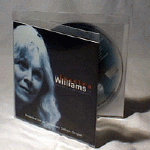 up about a tenth of the shelf space it did in a conventional jewel box. The small downside is that in the sleeves the spines of the tray cards are not as easy to read as they were in the jewel boxes. Filing alphabetically, I have no trouble finding the CD I'm looking for. Random browsing is slightly more difficult that it was, but that is a small price to pay for the gain of space.
up about a tenth of the shelf space it did in a conventional jewel box. The small downside is that in the sleeves the spines of the tray cards are not as easy to read as they were in the jewel boxes. Filing alphabetically, I have no trouble finding the CD I'm looking for. Random browsing is slightly more difficult that it was, but that is a small price to pay for the gain of space.
I have no connection with Jazz Loft other than as a consumer; no endorsement deal, no price cut. I'm sure that there are other companies in the vinyl sleeve game, but this is the one with which I'm happy. If passing along the information helps other Rifftiders who suffer from the effects of CD proliferation, I'm even happier.
My wife asks what I'll do when all the shelf space is taken by the sleeves. I'll face that problem when it comes. By then, Steve Jobs will probably have perfected a brain implant connected to all of the music in the world. There's a scary thought.
Transferring the discs from hard plastic boxes to soft vinyl sleeves takes time. I use it to catch up on my listening.
Does anybody want to buy a thousand empty jewel boxes?
 James Carter, Present Tense (Emarcy). When he burst onto the jazz scene from Detroit in the early '90s, Carter's virtuosity on an arsenal of woodwinds sometimes overrode content in his music. After a three-year recording hiatus, he reappears with no loss of dazzle and with the benefits of self-editing. Carter mixes original compositions and classics. Highlights: the rhythmic intensity of his flute work on Dodo Marmarosa's "Dodo's Bounce," his reflective gospel coda to a speedy baritone saxophone romp through Gigi Gryce's "Hymn of the Orient," his bass clarinet evocation of Eric Dolphy on "Bro. Dolphy."
James Carter, Present Tense (Emarcy). When he burst onto the jazz scene from Detroit in the early '90s, Carter's virtuosity on an arsenal of woodwinds sometimes overrode content in his music. After a three-year recording hiatus, he reappears with no loss of dazzle and with the benefits of self-editing. Carter mixes original compositions and classics. Highlights: the rhythmic intensity of his flute work on Dodo Marmarosa's "Dodo's Bounce," his reflective gospel coda to a speedy baritone saxophone romp through Gigi Gryce's "Hymn of the Orient," his bass clarinet evocation of Eric Dolphy on "Bro. Dolphy."
David Braid Sextet, Zhen (DB). The pianist-composer and five other  prominent Canadians
stomp with gusto in "Fishers of Men," create compelling lyricism in "Lydian Sky" and find something new in Coltrane's "Giant Steps." Braid's sidemen include bassist Steve Wallace, drummer Terry Clarke and the remarkable saxophonist Mike Murley. Superior small-band music arranged by Braid with ingenuity and wit.
prominent Canadians
stomp with gusto in "Fishers of Men," create compelling lyricism in "Lydian Sky" and find something new in Coltrane's "Giant Steps." Braid's sidemen include bassist Steve Wallace, drummer Terry Clarke and the remarkable saxophonist Mike Murley. Superior small-band music arranged by Braid with ingenuity and wit.
 Swiss Jazz Orchestra and Jim McNeely, Paul Klee (Mons). Swiss Jazz Orchestra leader George Robert asked McNeely to compose an album's worth of pieces inspired by Klee's paintings. "I've always loved Klee's work, so I put a lot of research into his life and his methods and his writings," McNeely told me recently. The result is eight Klee impressions incorporating the vision and resourcefulness of one of the best living writers of music. They include a conceptualization of Ad Parnassum (seen here) that matches its inspiration's mystery, allusion and whimsy. To learn more about McNeely, go to All About Jazz for a comprehensive verbatim interview.
Swiss Jazz Orchestra and Jim McNeely, Paul Klee (Mons). Swiss Jazz Orchestra leader George Robert asked McNeely to compose an album's worth of pieces inspired by Klee's paintings. "I've always loved Klee's work, so I put a lot of research into his life and his methods and his writings," McNeely told me recently. The result is eight Klee impressions incorporating the vision and resourcefulness of one of the best living writers of music. They include a conceptualization of Ad Parnassum (seen here) that matches its inspiration's mystery, allusion and whimsy. To learn more about McNeely, go to All About Jazz for a comprehensive verbatim interview.
 Rosa Passos, Romance (Telarc). The greatest mistress of Brazilian song since Elis Regina sings a dozen love songs. Accompanied by small groups of superb musicians from her country, she sustains an air of enchantment and saudade, her small, rich voice simultaneously transmitting innocence and world-weariness.
Rosa Passos, Romance (Telarc). The greatest mistress of Brazilian song since Elis Regina sings a dozen love songs. Accompanied by small groups of superb musicians from her country, she sustains an air of enchantment and saudade, her small, rich voice simultaneously transmitting innocence and world-weariness.
Ellis Marsalis, An Open Letter to Thelonious (ELM). If you're not going to be
 swallowed by Thelonious Monk's mystique, recording a program of Thelonious Monk tunes with a rhythm section and a tenor saxophone requires a strong sense of self. Marsalis has that sense. He doesn't solo on piano like Monk and he doesn't comp like Monk behind saxophonist Derek Douget, who does not play like Charlie Rouse. Yet, the two of them, drummer Jason Marsalis and bassist Jason Stewart observe the letter of Monk's music in the ensembles while accommodating it to their own spirits in their improvisation. Once, in his unaccompanied "'Round Midnight," Marsalis offers as a direct tribute an oh-by-the-way Monkish interval of a second. "Jackie-ing," with its off-beat metre between Marsalis and Douget, is pure joy. I've been listening to Marsalis for forty years. I've never enjoyed him more than in this recording.
swallowed by Thelonious Monk's mystique, recording a program of Thelonious Monk tunes with a rhythm section and a tenor saxophone requires a strong sense of self. Marsalis has that sense. He doesn't solo on piano like Monk and he doesn't comp like Monk behind saxophonist Derek Douget, who does not play like Charlie Rouse. Yet, the two of them, drummer Jason Marsalis and bassist Jason Stewart observe the letter of Monk's music in the ensembles while accommodating it to their own spirits in their improvisation. Once, in his unaccompanied "'Round Midnight," Marsalis offers as a direct tribute an oh-by-the-way Monkish interval of a second. "Jackie-ing," with its off-beat metre between Marsalis and Douget, is pure joy. I've been listening to Marsalis for forty years. I've never enjoyed him more than in this recording.
Mark Stryker of The Detroit Free Press sent the following comment about the current DVD in Doug's Picks:
In honor of your DVD - Sinatra and Peggy Lee. "Ooh."
Among all the other good things in this clip: Sinatra's chops. How about that effortless low F at 1:54.
Ooh.
Please direct your attention to the center column, where under Doug's Picks you will find new recommendations for three CDs, a DVD and a book.
 the pianist, flutist and composer returns to his native Brazil and collaborates with eleven of his countrymen. The music is based in the baiãos, forrós, xotes and other rich forms of Northeastern Brazil. It is intensely rhythmic, melodic and full of adventure. Indigenous percussion and stringed instruments meld beautifully with Santos Neto's jazz concepts. Once you've heard Toninho Ferragutti's playing in the tradition of the great Sivuca, you may think twice before you tell your next accordion joke.
the pianist, flutist and composer returns to his native Brazil and collaborates with eleven of his countrymen. The music is based in the baiãos, forrós, xotes and other rich forms of Northeastern Brazil. It is intensely rhythmic, melodic and full of adventure. Indigenous percussion and stringed instruments meld beautifully with Santos Neto's jazz concepts. Once you've heard Toninho Ferragutti's playing in the tradition of the great Sivuca, you may think twice before you tell your next accordion joke.
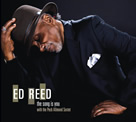 Ed Reed, The Song Is You (Blue Shorts). His career was derailed by a troubled life, but as he approaches his eightieth year, Reed's second CD confirms that he is a singer who serves the song. Not a great vocal technician, he specializes in phrasing and interpretation that penetrate to the heart and meaning of lyrics. Among thirteen well-chosen songs, the title tune and "Lucky To Be Me" are essential performances. The small band led by Peck Allmond includes Russell George, once a superb bassist, now an equally good violinist.
Ed Reed, The Song Is You (Blue Shorts). His career was derailed by a troubled life, but as he approaches his eightieth year, Reed's second CD confirms that he is a singer who serves the song. Not a great vocal technician, he specializes in phrasing and interpretation that penetrate to the heart and meaning of lyrics. Among thirteen well-chosen songs, the title tune and "Lucky To Be Me" are essential performances. The small band led by Peck Allmond includes Russell George, once a superb bassist, now an equally good violinist.
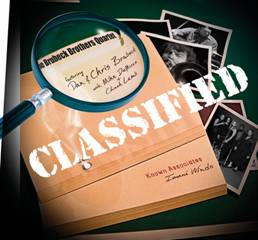 Brubeck Brothers Quartet, Classified (Koch). The band headed by bassist/trombonist Chris and drummer Dan Brubeck is in top form on seven new quartet compositions, an impressive chamber suite and a stirring ensemble version of their father's "Blue Rondo a la Turk." Guitarist Mike DeMicco, pianist Chuck Lamb and the brothers have become one of the tightest ensembles in jazz without losing their sense of surprise, even abandon. When they combine with the Imani Winds for Chris Brubeck's three-movement "Vignettes for Nonet," they introduce a substantial new concert piece full of rich textures and rhythms.
Brubeck Brothers Quartet, Classified (Koch). The band headed by bassist/trombonist Chris and drummer Dan Brubeck is in top form on seven new quartet compositions, an impressive chamber suite and a stirring ensemble version of their father's "Blue Rondo a la Turk." Guitarist Mike DeMicco, pianist Chuck Lamb and the brothers have become one of the tightest ensembles in jazz without losing their sense of surprise, even abandon. When they combine with the Imani Winds for Chris Brubeck's three-movement "Vignettes for Nonet," they introduce a substantial new concert piece full of rich textures and rhythms.
 Fever, The Music of Peggy Lee (Capitol). This quasi-documentary sketches Peggy Lee's life and career. Its greatest contribution is the use of performance clips, interviews and informal films to create a portrait of a gifted artist whose human warmth matched her talent. She was terrific even in a shampoo commercial. Her first husband, the guitarist Dave Barbour, remained her great love even beyond their divorce. The bonus clip of Lee singing "I Only Have Eyes for You" to Barbour as he accompanies her underlines the heartbreaking story better than the script does in the main section.
Fever, The Music of Peggy Lee (Capitol). This quasi-documentary sketches Peggy Lee's life and career. Its greatest contribution is the use of performance clips, interviews and informal films to create a portrait of a gifted artist whose human warmth matched her talent. She was terrific even in a shampoo commercial. Her first husband, the guitarist Dave Barbour, remained her great love even beyond their divorce. The bonus clip of Lee singing "I Only Have Eyes for You" to Barbour as he accompanies her underlines the heartbreaking story better than the script does in the main section.
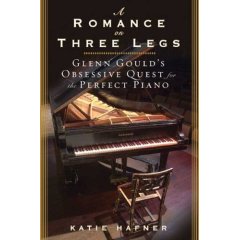 d's search for the perfect piano allows us to know the great pianist--and great eccentric--a little better. The book is a superb piece of reporting, its subtext a meditation on the compelling nature of music and its ability to inspire obsession.
d's search for the perfect piano allows us to know the great pianist--and great eccentric--a little better. The book is a superb piece of reporting, its subtext a meditation on the compelling nature of music and its ability to inspire obsession.
Every once in a while, news appears to remind us of the extent to which jazz has become an international art form and field of study. For example:
The Romanian venture has come about largely through the efforts of an American musician and professor named Tom Smith, with a boost from the US embassy and the Fulbright Commission. Perhaps our government has not abandoned cultural diplomacy, after all. To read more, click here.The third annual Romanian Jazz Education Summit will begin July 5, and last until July 10, 2008. All jazz music educators and most Romanian jazz students will attend. As always, the purpose of this summit is to provide intensive/detailed instruction of American jazz education techniques for Romanian educators and students through the assistance of dedicated mostly American jazz educators. The approximately 100 educators and selected performers will meet in the rustic Carpathian village of Jupinesti, away from the numerous distractions of cities like Bucharest.
Rifftides reader Ian Bradley writes:
I have been meaning to write for a while to say how much I enjoy reading Rifftides. I was prompted to write following your two most recent posts on Bill Finegan and Billy Strayhorn. Whilst Glenn Miller's music is often denigrated in jazz circles - criticised for something it never set out to be - I always thought there was lot in there to listen for.
I was fascinated to read - in David Hajdu's Strayhorn biography, I think - that Billy Strayhorn had listened to, knew and appreciated all of Finegan's work for the Miller band. I am sorry to think that only until a couple of days ago, we still had with us the man who created that legendary arrangement of "Little Brown Jug" - and that there existed such friendship between two such great arrangers. Add that I think Bill Finegan tutored and offered much to the young Nelson Riddle and you have the three greatest writers of a time when that sad disjuncture between popular music and jazz, written and improvised work, did not exist--and popular music was all the richer for it.
( Mr. Bradley blogs at The Record Shows. -- DR)
Billy Strayhorn, Duke Ellington's creative alter-ego, continues to connect with old audiences and find new ones. His music is for everyone, but it is no surprise
 that Strayhorn's story and songs move the gay community, in which he has become a symbol and icon. The Gay Mens Chorus of Los Angeles paid tribute to Strayhorn last year near the fortieth anniversary of his death on May 31, 1967. Video of that ninety-minute production is now streaming in full on the internet. The chorus sings Strayhorn's music with the swing and nuance it deserves.
that Strayhorn's story and songs move the gay community, in which he has become a symbol and icon. The Gay Mens Chorus of Los Angeles paid tribute to Strayhorn last year near the fortieth anniversary of his death on May 31, 1967. Video of that ninety-minute production is now streaming in full on the internet. The chorus sings Strayhorn's music with the swing and nuance it deserves.
Alan Broadbaent wrote the choral arrangements and the big band charts, led the band and played piano on some pieces. The rhythm section is Broadbent's trio with bassist Putter Smith and drummer Clayton Cameron. Saxophonists Gary Foster and Bob Sheppard and trumpeter Steve Hofsteter are among the band members. The guest vocalist, enthusiastically received by the audience, is Tierney Sutton. Among the highlights, despite the distractions of strange pseudo-Fosse choreography, is the trio's exploration of Strayhorn's "Upper Manhattan Medical Group." Jazz listeners will also appreciate Broadbent's piano accompaniment and arrangement of "Lush Life" for Billy Porter, who narrates the evening and is an effective singer of Strayhorn's songs. Click here to go to the Gay Mens Chorus of Los Angeles site, then click on the May 5, 2007 video at the bottom of the screen. Once it is running, double click on the picture to make it full screen. Do this when you have a spare hour and a half to enjoy it.
Here is a rare and much shorter video of Strayhorn performing his most famous composition with the Duke Ellington Orchestra.
For part of a documentary about Strayhorn, and Ellington's reaction to his death, go here. If you wish to fully explore Strayhorn's life and career, read Lush Life, the biography by David Hajdu. Not long after Strayhorn died, Ellington and his band recorded this heartfelt tribute. The CD of Strayhorn compositions is one of the best albums of Ellington's later career.
Great artists pay homage to Billy Strayhorn's God-given ability and mastery of his craft. Because he had a rare sensitivity and applied himself to his gifts, he successfully married melody, words and harmony, equating the fitting with happiness. -- Duke Ellington
'A' Train was born without any effort - if was like writing a letter to a friend. -- Billy Strayhorn
Bob Brookmeyer sent this message today:
Bill Finegan passed peacefully on today with his son James and his daughter Helen by his side. He was a hero, a dear friend and one of the most gifted arrangers we have ever had. Somewhere an orchestra sounds better.
Finegan was an arranger who gave Glenn Miller and Tommy Dorsey some of their most
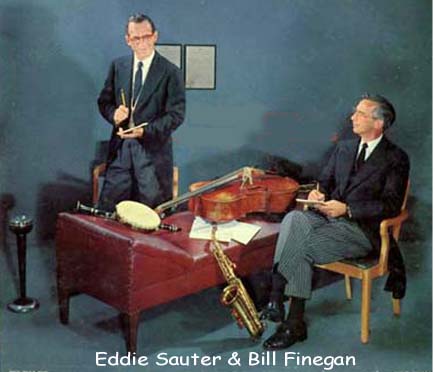 substantial music. In 1952 he and Eddie Sauter formed the Sauter-Finegan Orchestra, which was famous for its musicianship, wit and a couple of hits that included its theme song, a panoramic arrangement of "Doodletown Fifers." At one time or another, the band included musicians of the quality of Nick Travis, Urbie Green, Eddie Bert, Mundell Lowe, George Duvivier, Eddie Costa and Don Lamond. This CD has a cross-section of the band's work.
substantial music. In 1952 he and Eddie Sauter formed the Sauter-Finegan Orchestra, which was famous for its musicianship, wit and a couple of hits that included its theme song, a panoramic arrangement of "Doodletown Fifers." At one time or another, the band included musicians of the quality of Nick Travis, Urbie Green, Eddie Bert, Mundell Lowe, George Duvivier, Eddie Costa and Don Lamond. This CD has a cross-section of the band's work.
Finegan once said, ''From the time the late Eddie Sauter and I started this band, everything went wrong but the music." To read more, go here.
Bill Finegan was ninety-one.
Here's something I've been saving for a slow day--that is, a day when I haven't prepared a new posting. It's Freddie Hubbard in 1962 at age twenty-four, getting famous with Art Blakey and the Jazz Messengers. To many, this was the Blakey band. It had Wayne Shorter, Curtis Fuller, Cedar Walton, Reggie Workman and Hubbard. Watch for Blakey's smile when Hubbard tears into the second chorus of his solo with that beautifully placed allusion to "Why Don't You Do Right?"
.
It's too bad this is cut short after Hubbard, but with YouTube, you take what you get.
If someone wants to play music you do not have to get a ruler or whips to make them practice.--Thelonious Monk.
They would tell me to practice, and they would get on my case, but only because they knew that's what I wanted to do. They never really did pressure me. They wouldn't have made me take lessons if my heart wasn't in it. I was 3 or 4 years old, and I wanted it.--Taylor Eigsti
The Rifftides staff has no more intention of making this blog a birthday watch than of making it a death watch, although there is an endless supply of both phenomena. However, on the Jazz West Coast listserve, Desne Villepigue pointed out that yesterday was the eighty-fourth anniversary of Hal McKusick's appearance in the world, and that is worth noting. McKusick was one of the most rewarding alto saxophone soloists of the fifties and sixties. He is still active as a player, teacher and inspirer of young musicians.
The screen below brings you his 1958 recording of Charlie Parker's "Now's The Time." There was no movie camera in the studio; we should be so lucky. The visuals are album covers. This arrangement for four saxophones incorporates a harmonized transcription of Parker's solo on the original 1945 Savoy recording of the piece. It predates by fourteen years Supersax, the group that became famous for this sort of thing. The other saxophonists are Frank Socolow, alto; Dick Hafer, tenor; and Jay Cameron, baritone. Solos are by McKusick, pianist Bill Evans and bassist Paul Chambers. The drummer Connie Kay. Contrary to YouTube's information, trumpeter Art Farmer is not present.
Farmer is on several other tracks of the CD, which is a cross-section of music from McKusick's fine series of albums for Decca. To learn more about McKusick, see Marc Myers' series of interviews with him on JazzWax.
Butch Warren was a fixture on Blue Note albums in the
 1960s. One of the bright young bassists of his generation, he recorded with Herbie Hancock, Dexter Gordon, Jackie McLean, Thelonious Monk and others. Then he disappeared.
1960s. One of the bright young bassists of his generation, he recorded with Herbie Hancock, Dexter Gordon, Jackie McLean, Thelonious Monk and others. Then he disappeared.
Reporting for MSNBC, Antoine Sanfuentes found Warren, traced his success, downward trajectory and attempt to re-etablish his career. The piece includes a link to a video profile of Warren. Thanks to Larry Appelbaum for calling our attention to it.
For more on Warren, from The Washington Post, go here and here.
AJ Ads
AJ Blogs
AJBlogCentral | rssculture
Terry Teachout on the arts in New York City
Andrew Taylor on the business of arts & culture
rock culture approximately
Laura Collins-Hughes on arts, culture and coverage
Richard Kessler on arts education
Douglas McLennan's blog
Dalouge Smith advocates for the Arts
Art from the American Outback
Chloe Veltman on how culture will save the world
For immediate release: the arts are marketable
No genre is the new genre
David Jays on theatre and dance
Paul Levy measures the Angles
Judith H. Dobrzynski on Culture
John Rockwell on the arts
innovations and impediments in not-for-profit arts
Jan Herman - arts, media & culture with 'tude
dance
Apollinaire Scherr talks about dance
Tobi Tobias on dance et al...
jazz
Howard Mandel's freelance Urban Improvisation
Focus on New Orleans. Jazz and Other Sounds
Doug Ramsey on Jazz and other matters...
media
Jeff Weinstein's Cultural Mixology
Martha Bayles on Film...
classical music
Fresh ideas on building arts communities
Greg Sandow performs a book-in-progress
Harvey Sachs on music, and various digressions
Bruce Brubaker on all things Piano
Kyle Gann on music after the fact
Greg Sandow on the future of Classical Music
Norman Lebrecht on Shifting Sound Worlds
Joe Horowitz on music
publishing
Jerome Weeks on Books
Scott McLemee on books, ideas & trash-culture ephemera
theatre
Wendy Rosenfield: covering drama, onstage and off
visual
Public Art, Public Space
Regina Hackett takes her Art To Go
John Perreault's art diary
Lee Rosenbaum's Cultural Commentary
